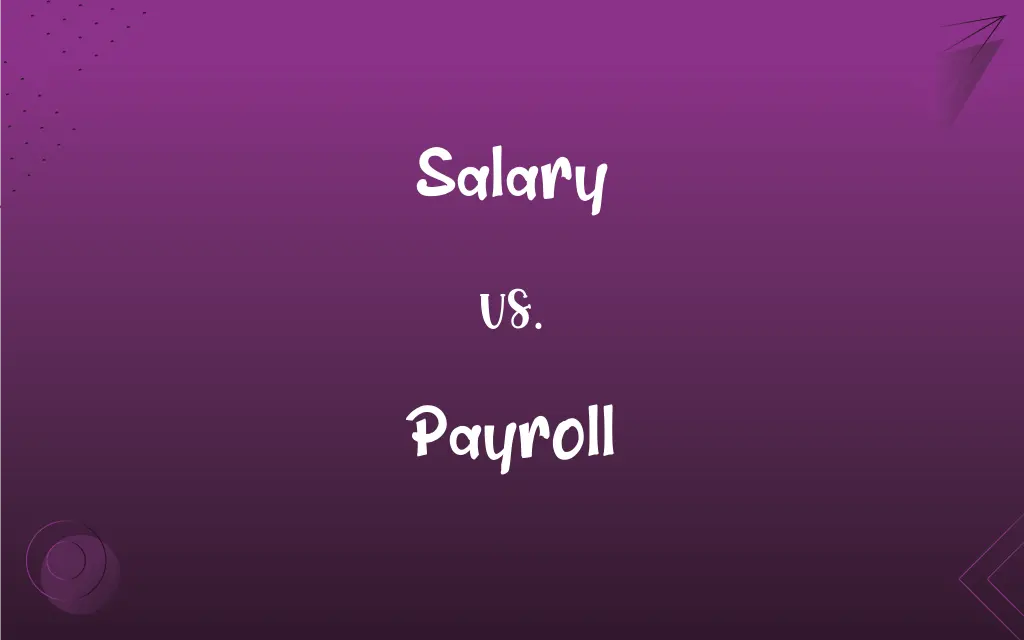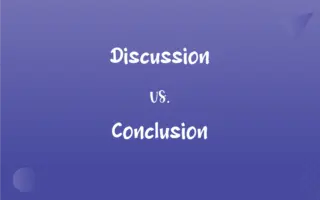Salary vs. Payroll: What's the Difference?
Edited by Aimie Carlson || By Janet White || Updated on October 7, 2023
A salary is a fixed compensation paid to an employee, while payroll refers to the total of all compensation a company pays to its employees.

Key Differences
A salary is typically an amount agreed upon between an employer and an employee, which is given for services rendered, usually on a monthly or bi-weekly basis. In contrast, payroll encompasses the entire process and system of paying employees and includes not just salaries, but also wages, bonuses, and deductions.
While an individual's salary might remain consistent over a given period unless negotiated or changed, payroll amounts can fluctuate based on the number of employees, overtime hours worked, bonuses awarded, and other variable factors.
Salary usually denotes a set amount given to salaried employees irrespective of the number of hours they work. Payroll, on the other hand, is a broader term and involves the meticulous task of calculating and distributing paychecks, maintaining records, and ensuring that taxes and other deductions are properly managed.
Discussions about salary often arise during job interviews, appraisals, or when considering a career move. Payroll discussions are more common among HR professionals, accountants, and company executives who are concerned with budgeting, employee compensation, and compliance with tax regulations.
From a tax perspective, an individual's salary is subject to income tax and other potential deductions. Payroll systems, however, must handle multiple types of taxes, including income tax, Social Security, Medicare, and unemployment taxes, among others.
ADVERTISEMENT
Comparison Chart
Nature
Fixed compensation for services
Total compensation paid to employees
Scope
Specific to an individual
Encompasses all employees and forms of compensation
Frequency
Often consistent over a period
Can vary based on numerous factors
Associated Terms
Annual, monthly, or bi-weekly income
Wages, bonuses, deductions, taxes
Usage Context
Common in job negotiations and appraisals
Discussed in HR, accounting, and executive settings
ADVERTISEMENT
Salary and Payroll Definitions
Salary
Wages paid at a consistent rate, irrespective of hours worked.
Despite working extra hours, her salary remained the same.
Payroll
A list or database of employees to be paid, along with the amount due to each.
HR updated the payroll to reflect the recent promotions.
Salary
Fixed compensation received by an employee for services rendered.
His salary was competitive for the industry standard.
Payroll
The process of calculating and distributing wages and salaries.
The payroll department ensured everyone was paid on time.
Salary
A regular payment made by employers to employees, especially a professional or white-collar worker.
She received her salary on the last day of each month.
Payroll
A department or system responsible for processing paychecks and related tasks.
She worked in the payroll department, handling deductions and taxes.
Salary
Compensation not based on hourly wages or commission.
He preferred a steady salary over fluctuating commission rates.
Payroll
Encompassing all employee-related financial records, taxes, and insurance.
Ensuring payroll compliance with tax laws was crucial for the business.
Salary
Fixed compensation for services, paid to a person on a regular basis.
Payroll
A list of employees receiving wages or salaries, with the amounts due to each.
Salary
A fixed amount of money paid to a worker, usually calculated on a monthly or annual basis, not hourly, as wages. Implies a degree of professionalism and/or autonomy.
Payroll
The total sum of money to be paid out to employees at a given time.
Salary
To pay on the basis of a period of a week or longer, especially to convert from another form of compensation.
Payroll
A list of employees who receive salary or wages, together with the amounts due to each.
Salary
(obsolete) Saline.
Payroll
The total sum of money paid to employees.
Salary
Saline
Payroll
(accounting) The calculation of salaries and wages and the deduction of taxes etc.; the department in a company responsible for this.
Salary
The recompense or consideration paid, or stipulated to be paid, to a person at regular intervals for services; fixed wages, as by the year, quarter, or month; stipend; hire.
This is hire and salary, not revenge.
Payroll
(euphemistic) Bribes paid to people.
Salary
To pay, or agree to pay, a salary to; to attach salary to; as, to salary a clerk; to salary a position.
Payroll
(transitive) To place on a payroll.
Salary
Something that remunerates;
Wages were paid by check
He wasted his pay on drink
They saved a quarter of all their earnings
Payroll
A list of employees and their salaries;
The company had a long payroll
Salary
A predetermined amount, often reflecting skills, experience, and education.
The CEO's salary was a reflection of his decades of experience.
Payroll
The total amount of money paid in wages;
The company had a large payroll
Payroll
The department that determines the amounts of wage or salary due to each employee
Payroll
The total amount of money that a company pays to its employees.
The company's payroll expenses increased due to new hires.
FAQs
What types of compensation are included in payroll?
Payroll includes salaries, wages, bonuses, and other forms of employee compensation.
Is a salary always paid monthly?
No, a salary can be paid weekly, bi-weekly, or monthly, depending on the agreement.
Can a salary change over time?
Yes, a salary can change due to appraisals, promotions, or negotiations.
What's the main responsibility of the payroll department?
The payroll department manages the payment process for employees.
What does an individual's salary represent?
A salary represents the fixed compensation an individual receives for their work.
Do all employees receive a salary?
No, some employees might receive hourly wages instead of a salary.
Is a salary always a reflection of work hours?
No, a salary is a fixed amount, regardless of the hours worked.
Can a salary be negotiated?
Yes, salary is often a point of negotiation during job offers or appraisals.
Can software be used to manage payroll?
Yes, many companies use payroll software to streamline the payment process.
What's a common challenge with payroll management?
Ensuring accurate and timely payments, along with tax compliance, are challenges in payroll management.
Are contractors included in a company's payroll?
Typically, contractors aren't on the company's regular payroll as they're paid separately.
What's the difference between salary and hourly wages?
Salary is a fixed amount, while hourly wages depend on the hours worked.
What role does payroll play in tax deductions?
Payroll is responsible for calculating and withholding the appropriate tax amounts from employee pay.
How often is payroll typically processed?
Payroll is typically processed on a set schedule, like weekly, bi-weekly, or monthly.
Is salary the only form of employee compensation?
No, salary is one form, with others being hourly wages, bonuses, and commissions.
How is payroll related to taxes?
Payroll includes the calculation and withholding of taxes from employee compensation.
Can bonuses be a part of a salary package?
Yes, bonuses can be part of a salary package but might be contingent on performance or company profits.
Can a person's salary be confidential?
Yes, many companies keep individual salary amounts confidential.
What's a payroll tax?
A payroll tax is a tax an employer withholds and/or pays on behalf of their employees based on the salary or wage of the employee.
Is payroll just about paying employees?
No, payroll also involves recording payments, managing deductions, and ensuring tax compliance.
About Author
Written by
Janet WhiteJanet White has been an esteemed writer and blogger for Difference Wiki. Holding a Master's degree in Science and Medical Journalism from the prestigious Boston University, she has consistently demonstrated her expertise and passion for her field. When she's not immersed in her work, Janet relishes her time exercising, delving into a good book, and cherishing moments with friends and family.
Edited by
Aimie CarlsonAimie Carlson, holding a master's degree in English literature, is a fervent English language enthusiast. She lends her writing talents to Difference Wiki, a prominent website that specializes in comparisons, offering readers insightful analyses that both captivate and inform.
































































